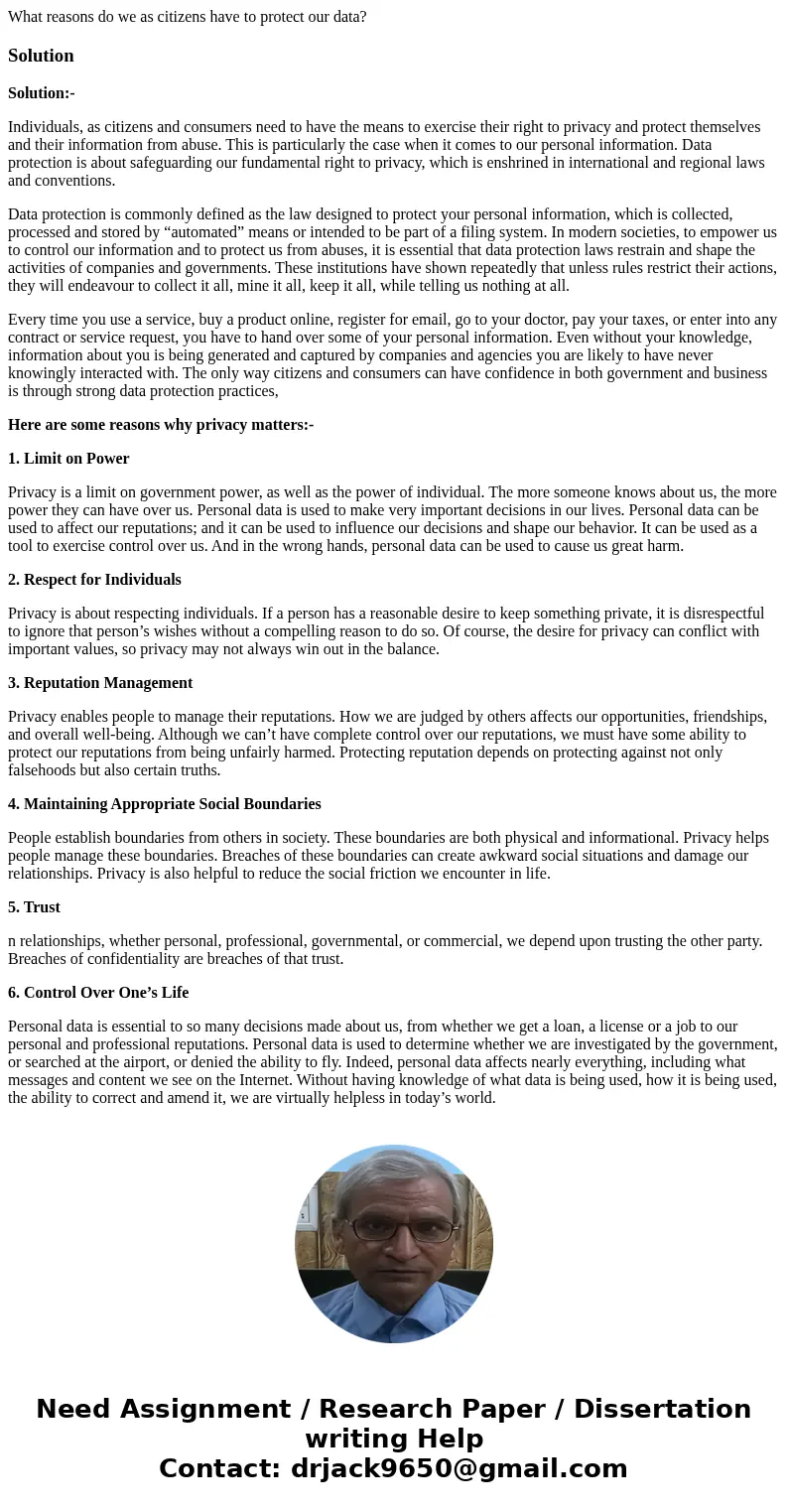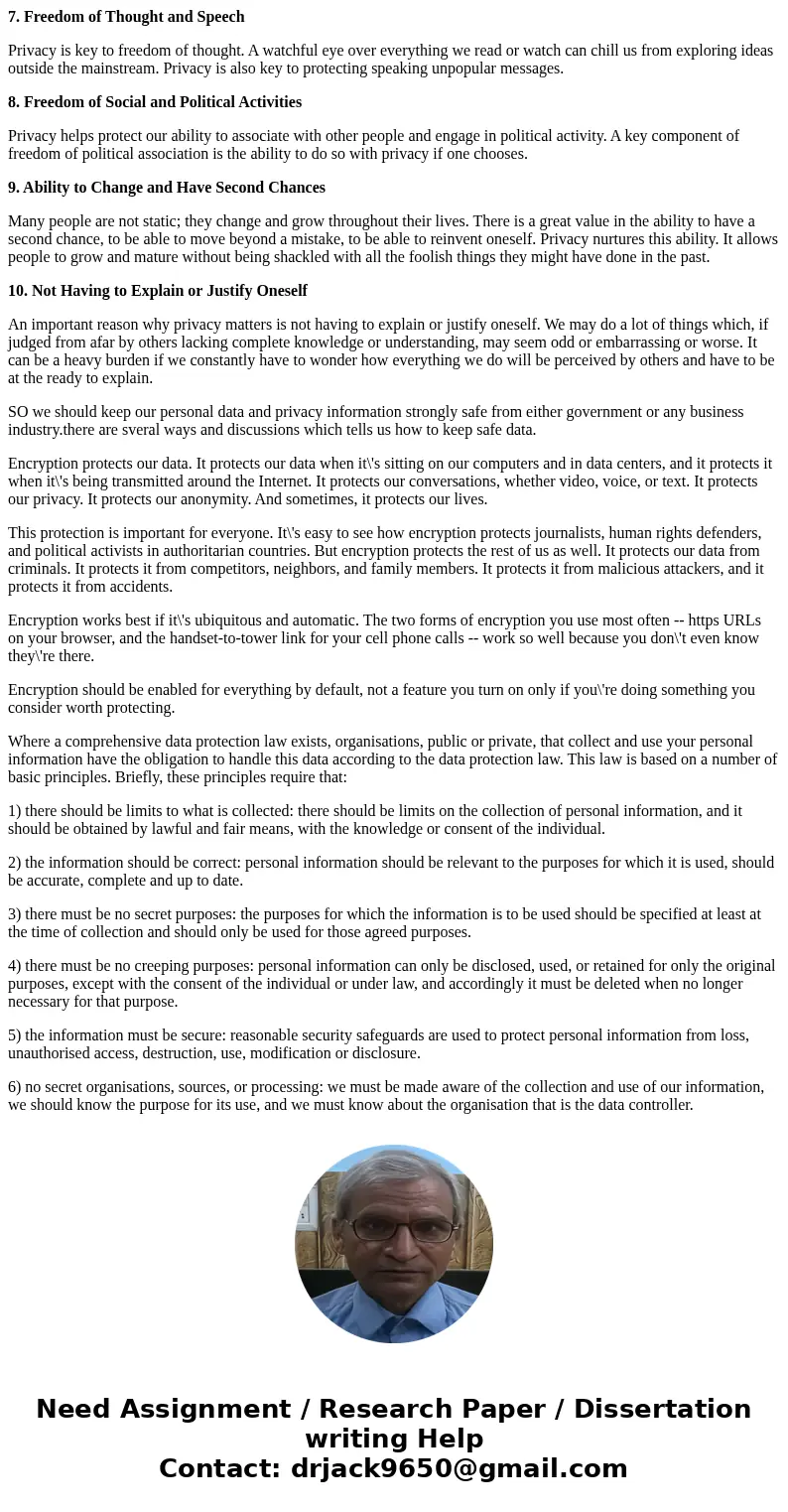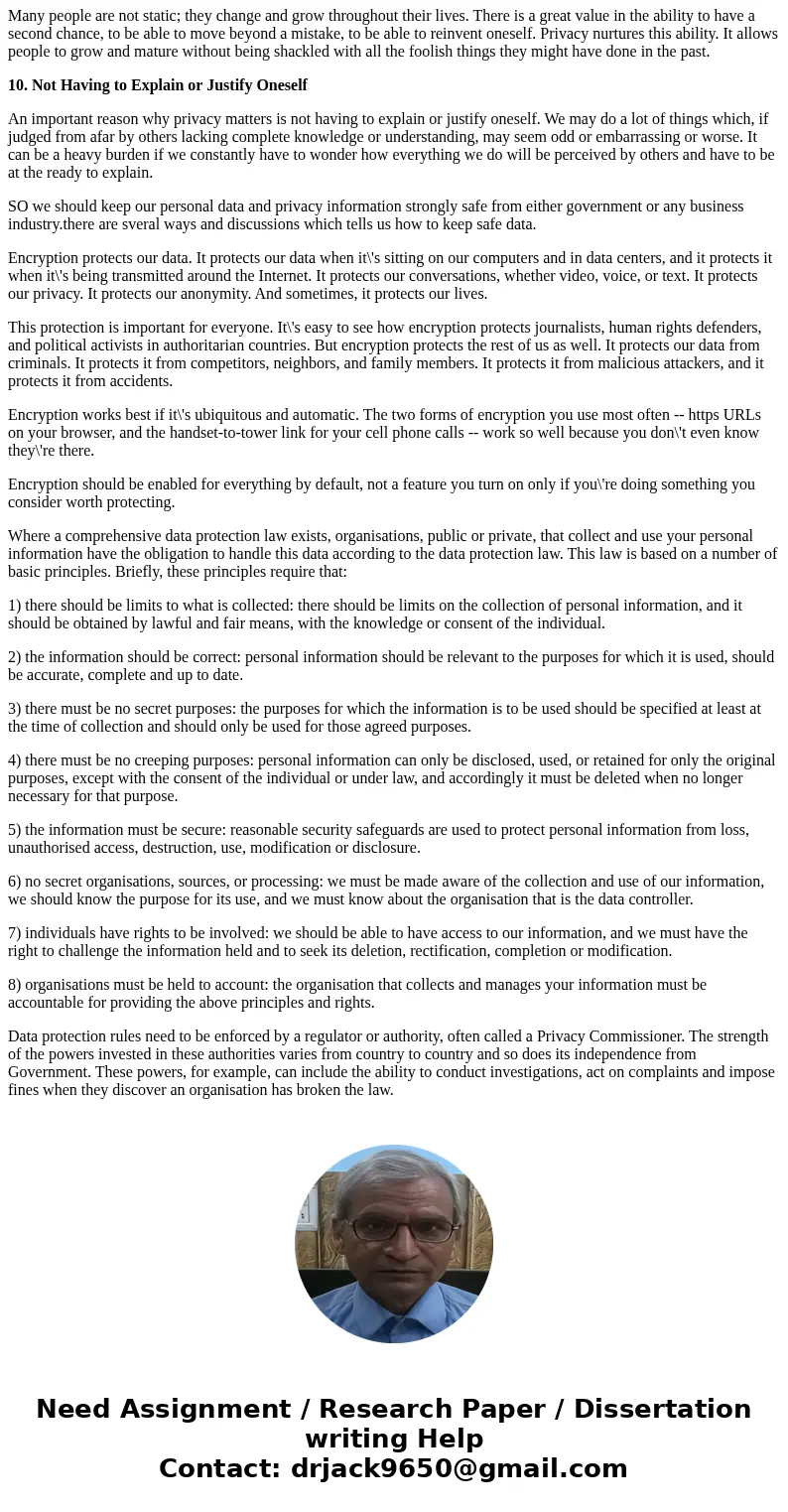What reasons do we as citizens have to protect our dataSolut
What reasons do we as citizens have to protect our data?
Solution
Solution:-
Individuals, as citizens and consumers need to have the means to exercise their right to privacy and protect themselves and their information from abuse. This is particularly the case when it comes to our personal information. Data protection is about safeguarding our fundamental right to privacy, which is enshrined in international and regional laws and conventions.
Data protection is commonly defined as the law designed to protect your personal information, which is collected, processed and stored by “automated” means or intended to be part of a filing system. In modern societies, to empower us to control our information and to protect us from abuses, it is essential that data protection laws restrain and shape the activities of companies and governments. These institutions have shown repeatedly that unless rules restrict their actions, they will endeavour to collect it all, mine it all, keep it all, while telling us nothing at all.
Every time you use a service, buy a product online, register for email, go to your doctor, pay your taxes, or enter into any contract or service request, you have to hand over some of your personal information. Even without your knowledge, information about you is being generated and captured by companies and agencies you are likely to have never knowingly interacted with. The only way citizens and consumers can have confidence in both government and business is through strong data protection practices,
Here are some reasons why privacy matters:-
1. Limit on Power
Privacy is a limit on government power, as well as the power of individual. The more someone knows about us, the more power they can have over us. Personal data is used to make very important decisions in our lives. Personal data can be used to affect our reputations; and it can be used to influence our decisions and shape our behavior. It can be used as a tool to exercise control over us. And in the wrong hands, personal data can be used to cause us great harm.
2. Respect for Individuals
Privacy is about respecting individuals. If a person has a reasonable desire to keep something private, it is disrespectful to ignore that person’s wishes without a compelling reason to do so. Of course, the desire for privacy can conflict with important values, so privacy may not always win out in the balance.
3. Reputation Management
Privacy enables people to manage their reputations. How we are judged by others affects our opportunities, friendships, and overall well-being. Although we can’t have complete control over our reputations, we must have some ability to protect our reputations from being unfairly harmed. Protecting reputation depends on protecting against not only falsehoods but also certain truths.
4. Maintaining Appropriate Social Boundaries
People establish boundaries from others in society. These boundaries are both physical and informational. Privacy helps people manage these boundaries. Breaches of these boundaries can create awkward social situations and damage our relationships. Privacy is also helpful to reduce the social friction we encounter in life.
5. Trust
n relationships, whether personal, professional, governmental, or commercial, we depend upon trusting the other party. Breaches of confidentiality are breaches of that trust.
6. Control Over One’s Life
Personal data is essential to so many decisions made about us, from whether we get a loan, a license or a job to our personal and professional reputations. Personal data is used to determine whether we are investigated by the government, or searched at the airport, or denied the ability to fly. Indeed, personal data affects nearly everything, including what messages and content we see on the Internet. Without having knowledge of what data is being used, how it is being used, the ability to correct and amend it, we are virtually helpless in today’s world.
7. Freedom of Thought and Speech
Privacy is key to freedom of thought. A watchful eye over everything we read or watch can chill us from exploring ideas outside the mainstream. Privacy is also key to protecting speaking unpopular messages.
8. Freedom of Social and Political Activities
Privacy helps protect our ability to associate with other people and engage in political activity. A key component of freedom of political association is the ability to do so with privacy if one chooses.
9. Ability to Change and Have Second Chances
Many people are not static; they change and grow throughout their lives. There is a great value in the ability to have a second chance, to be able to move beyond a mistake, to be able to reinvent oneself. Privacy nurtures this ability. It allows people to grow and mature without being shackled with all the foolish things they might have done in the past.
10. Not Having to Explain or Justify Oneself
An important reason why privacy matters is not having to explain or justify oneself. We may do a lot of things which, if judged from afar by others lacking complete knowledge or understanding, may seem odd or embarrassing or worse. It can be a heavy burden if we constantly have to wonder how everything we do will be perceived by others and have to be at the ready to explain.
SO we should keep our personal data and privacy information strongly safe from either government or any business industry.there are sveral ways and discussions which tells us how to keep safe data.
Encryption protects our data. It protects our data when it\'s sitting on our computers and in data centers, and it protects it when it\'s being transmitted around the Internet. It protects our conversations, whether video, voice, or text. It protects our privacy. It protects our anonymity. And sometimes, it protects our lives.
This protection is important for everyone. It\'s easy to see how encryption protects journalists, human rights defenders, and political activists in authoritarian countries. But encryption protects the rest of us as well. It protects our data from criminals. It protects it from competitors, neighbors, and family members. It protects it from malicious attackers, and it protects it from accidents.
Encryption works best if it\'s ubiquitous and automatic. The two forms of encryption you use most often -- https URLs on your browser, and the handset-to-tower link for your cell phone calls -- work so well because you don\'t even know they\'re there.
Encryption should be enabled for everything by default, not a feature you turn on only if you\'re doing something you consider worth protecting.
Where a comprehensive data protection law exists, organisations, public or private, that collect and use your personal information have the obligation to handle this data according to the data protection law. This law is based on a number of basic principles. Briefly, these principles require that:
1) there should be limits to what is collected: there should be limits on the collection of personal information, and it should be obtained by lawful and fair means, with the knowledge or consent of the individual.
2) the information should be correct: personal information should be relevant to the purposes for which it is used, should be accurate, complete and up to date.
3) there must be no secret purposes: the purposes for which the information is to be used should be specified at least at the time of collection and should only be used for those agreed purposes.
4) there must be no creeping purposes: personal information can only be disclosed, used, or retained for only the original purposes, except with the consent of the individual or under law, and accordingly it must be deleted when no longer necessary for that purpose.
5) the information must be secure: reasonable security safeguards are used to protect personal information from loss, unauthorised access, destruction, use, modification or disclosure.
6) no secret organisations, sources, or processing: we must be made aware of the collection and use of our information, we should know the purpose for its use, and we must know about the organisation that is the data controller.
7) individuals have rights to be involved: we should be able to have access to our information, and we must have the right to challenge the information held and to seek its deletion, rectification, completion or modification.
8) organisations must be held to account: the organisation that collects and manages your information must be accountable for providing the above principles and rights.
Data protection rules need to be enforced by a regulator or authority, often called a Privacy Commissioner. The strength of the powers invested in these authorities varies from country to country and so does its independence from Government. These powers, for example, can include the ability to conduct investigations, act on complaints and impose fines when they discover an organisation has broken the law.



 Homework Sourse
Homework Sourse